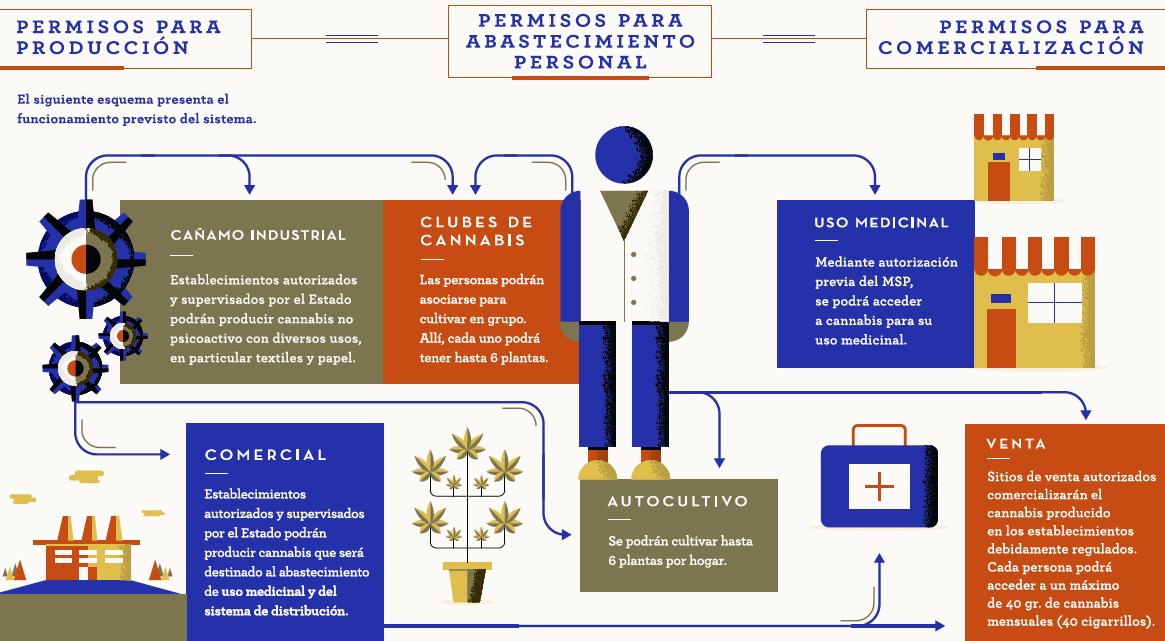Update: “Uruguay Approves Law to Legalize and Regulate Marijuana.”
EspañolJosé “Pepe” Mujica, president of Uruguay, wants to radically change the how of fighting drug trafficking — with an alternative to prohibition. Instead, it is the legalization of production, commercialization, and consumption of marijuana under the state’s constant watch, which will become the regulatory body of the marijuana market.
This proposal is reflected in the Law for Control of Marijuana and Derivatives, which will be debated today in the Uruguayan Senate, after being approved by the Chamber of Representatives in August. The ruling party, the Frente Amplio (Broad Front), has the majority in the Senate, with 16 out of 30 seats, so the final approval of this bill is set for tonight at around 7 p.m. UYST (4 p.m. EST).
“The problem is not the drug, but the drug trafficking, the mafia, the violence it generates,” Mujica said in an interview with Andrés Oppenheimer, on CNN Español. Drug trafficking is a social problem in this South American country, where a third of the prison population is deprived of liberty on account of alleged felonies related to drugs.
“When you forbid, especially for young people, you make it an attractive hook,” Mujica argued.
This bill that legalizes and regulates marijuana consists of 44 articles. The paragraph of General Principles, Article 4, asserts that the objective of this law is:
To protect the inhabitants of the country from the risks associated with the tie between illegal business and drug trafficking; seeking, through the State’s intervention, to attack the devastating sanitary, social and economic consequences of the problematic use of psychoactive substances, as well as to reduce the levels of drug trafficking and organized crime.
The Institute for Regulation and Control of Cannabis (IRCCA) will supervise the law’s implementation, with a Directive Board as its supreme governing body. This board’s leadership will have a representative for the national secretary of Drugs, joined by representatives from the Ministry of Livestock, Agriculture and Fisheries, the Ministry of Social Development, and the Ministry of Health.
This law separates consumption for medical use and personal use. Those who wish to buy cannabis for medical use will have to submit a medical prescription, and those who want it for personal use will have to identify themselves in registered retail outlets, which — once the bill is passed — will be regulated by the executive branch. The maximum volume of allowed consumption for personal use will be 40 grams of marijuana per month, approximately 20 cigarettes. Consumers will also be able to acquire marijuana through their own crops — up to a a maximum of six plants — or through cannabis clubs, with plant maximums proportional to the number of members.
To regulate consumption, the sale is prohibited to individuals under 18 years old, and advertising of marijuana is similarly banned. Drivers who are behind the wheel under the effects will be also punished, and any plants either beyond the individual limits or not authorized for sale will be destroyed. Also, the president of Uruguay is analyzing a mechanism to track marijuana cigarettes to avoid their sale in other countries.
“We won’t have to bother our neighbors,” he says.
Different NGOs have been involved in promoting this project and releasing information about its functioning, such as Regulación Responsable and ProDerechos. Camilo Collazo, from ProDerechos, explains that after the approval of this law, the executive branch will have 120 days to regulate its application. The process won’t be easy, because among many things, they have to supply pharmacies, which are the authorized sale points. Collazo also says this “opens a dilemma over those people who were imprisoned for having less than 40 grams of marijuana, and were not proved to be trafficking. Those people, in theory, should be released.”
This controversial bill has generated plenty of criticism, and not only from the opposition. They claim that this will increase the availability of marijuana, because it will be simultaneously in the legal and illegal markets. The United Nations has also criticized it, saying that by approving this bill, Uruguay will violate the Single Convention on Narcotic Drugs, 1961. Mujica denies that international treaties are being violated. On the other hand, Collazo suggests that an alternative for the country would be to report these treaties — in which the United Nations established a list of substances — as illegal themselves.
The Open Society Foundation, presided over by the Hungarian businessman George Soros, has offered the government of Uruguay the financing for an evaluation of the results that come from the application of this project. Several times, Uruguay’s president has identified this process of marijuana legalization and state-regulated supply as an experiment.
“Like any experiment, naturally, it has risks, and we have to be smart enough, because if it overcomes us, we will step back,” he said to AFP. On the contrary, if the experiment has good results, Mujica will make a stand on the way to legislate about psychotropic substances.
Scheme for the anticipated functioning of the new system (click here to enlarge). Source: ProDerechos.
Translated by Marcela Estrada.
 Versión Español
Versión Español













